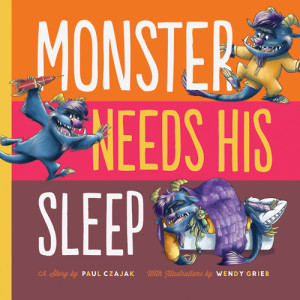
Scarletta needs a blog post For Monster’s book birthday. It’s time I talk on rhyming And the words I choose to say.
OK, enough of that. An entire blog post in rhyme might get a bit laborious… When I wrote my first Monster story, Monster Needs a Haircut (not yet published), I had never written in rhyme before. In fact, it never occurred to me to write in rhyme until I had the idea for this book. It just seemed natural for the story. After I wrote it, I knew it wasn’t perfect by any stretch; I made all the typical mistakes a newbie makes when it comes to rhyme. Things like near rhyme, counting syllables instead of beats, and changing the meter mid-story. Then I kept hearing from people how publishers don’t want rhyme so I re-wrote the story without it. Let me tell you, the story sucked. The plot itself was solid, but it just didn’t sound right. So I burned the non-rhyming copy and never looked back. I worked on crafting the rhyme and making it as perfect as I could before I submitted it. Of course you know how that turned out or you wouldn’t be following the blog tour!  This is a topic I have written about before in other blog posts on my own web site www.paulczajak.com . But what I haven’t talked about is my process of writing in rhyme and why I choose to “sprinkle” more advanced words into my stories. When it comes to my Monster & Me™stories, the title always comes first because the title becomes a part of the first line of the story. It sets the meter and it states the problem right off the bat. With Monster Needs His Sleep the first line is: Monster needs to get his sleep. Right then and there you know this is not going to be a simple bed time routine because if it were this would be a very short book. This is then confirmed in the rest of the first stanza:
This is a topic I have written about before in other blog posts on my own web site www.paulczajak.com . But what I haven’t talked about is my process of writing in rhyme and why I choose to “sprinkle” more advanced words into my stories. When it comes to my Monster & Me™stories, the title always comes first because the title becomes a part of the first line of the story. It sets the meter and it states the problem right off the bat. With Monster Needs His Sleep the first line is: Monster needs to get his sleep. Right then and there you know this is not going to be a simple bed time routine because if it were this would be a very short book. This is then confirmed in the rest of the first stanza:
Monster needs to get his sleep. It’s time to go to bed. But when I said it's sleepy time, he roared, "Let's play instead."
Now my meter and my rhyming pattern are set and as long as I stick to what I have established, I’m good to go, and this is all because of my title. But it’s not that simple. It’s not only the title that is critical, but how the following line relates to the title, especially since that is the line that is going to rhyme. Many times, I find I have a great first line that sets the stage but I can’t come up with the second line because of the words that rhyme with it. For example, in Monster Needs a Costume, I originally wanted to go with this:
Monster needs a costume Since it’s almost Halloween
The problem with this is that there aren’t many words that rhyme with Halloween to point my story in the direction I wanted to go. So I had to change the second line.
Monster needs a costume for his favorite time of year. "It’s nearly Halloween," he roared. "The day is almost here!"
Though year and here are not the most interesting of rhymes, it still works because it does the three most important things for me: It rhymes, it keeps the meter, and it sets the stage for the story. This brings me to the next topic: interesting rhyme or BIG WORDS! I am a huge proponent of increasing a child’s vocabulary through picture books. In fact I would say picture books are the perfect time to do it since there is a picture to help define the words. Some would say complicated words break the flow of the story because children will stop and ask what the word means. I say good! There will always be a place in rhyming books for words like run and fun and log and frog, but can’t we also have dramatically and emphatically, or profiterole and casserole? One of my favorite stanzas in Monster Needs His Sleep is:
Monster then fell out of bed (a bit dramatically). “I need a drink, I'm very parched!” He said emphatically.
Let me tell you, I took a little heat with this stanza in my critique group because of my word choice. I heard comments like, “a child would never say the word parched.” And I agreed, but a child would also never have a 9-foot blue monster sleeping in his bed! I also got hit with, “a child will not know what dramatically or emphatically means.” And they were right again. But I say: if a child can say the word, then they can learn the definition. I’ll say again, a picture book is the perfect time to increase vocabulary because the pictures give children the opportunity to figure it out for themselves. When I first read Monster Needs His Sleep (with the pictures) to my daughter, she stopped me and asked what emphatically means. I told her to look at the picture and tell me what she thinks it means. She said, “I think it means Monster really, really wants a drink of water.” I told her she was right and I could tell she was proud of herself for figuring it out. Granted she takes after me so she is obviously a genius, but isn’t this why we read books to our kids—to have them become better readers, and ultimately become more intelligent through reading? So I say use rhyme to help children learn to read and then throw in some words they are not going to understand as a way to challenge them. 
My post is done, but not complete. Until I end in rhyme. Make sure you read a Monster book, It’s perfect for bedtime.








Add new comment